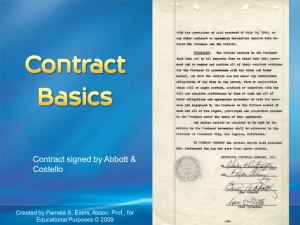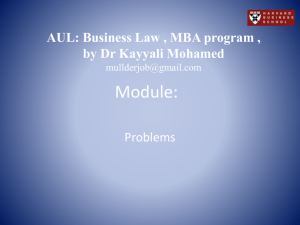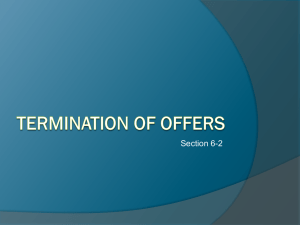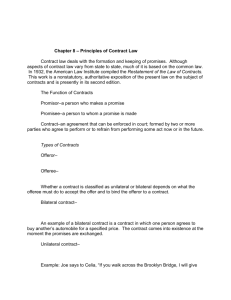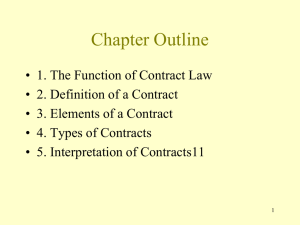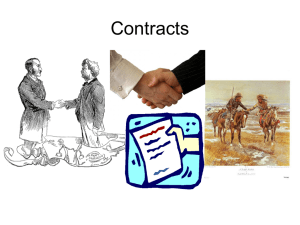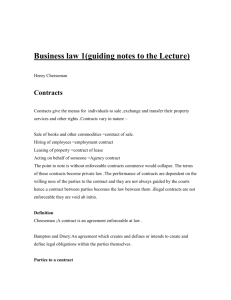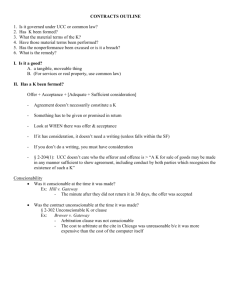Discussion 5 - Colorado Supreme Court
advertisement
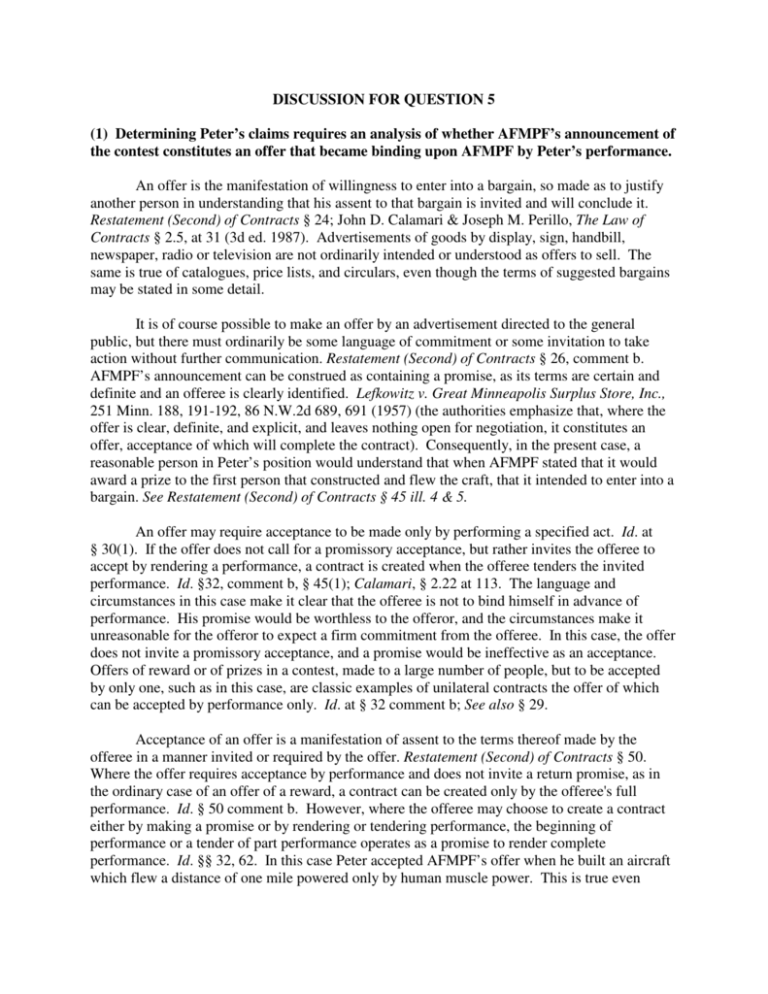
DISCUSSION FOR QUESTION 5 (1) Determining Peter’s claims requires an analysis of whether AFMPF’s announcement of the contest constitutes an offer that became binding upon AFMPF by Peter’s performance. An offer is the manifestation of willingness to enter into a bargain, so made as to justify another person in understanding that his assent to that bargain is invited and will conclude it. Restatement (Second) of Contracts § 24; John D. Calamari & Joseph M. Perillo, The Law of Contracts § 2.5, at 31 (3d ed. 1987). Advertisements of goods by display, sign, handbill, newspaper, radio or television are not ordinarily intended or understood as offers to sell. The same is true of catalogues, price lists, and circulars, even though the terms of suggested bargains may be stated in some detail. It is of course possible to make an offer by an advertisement directed to the general public, but there must ordinarily be some language of commitment or some invitation to take action without further communication. Restatement (Second) of Contracts § 26, comment b. AFMPF’s announcement can be construed as containing a promise, as its terms are certain and definite and an offeree is clearly identified. Lefkowitz v. Great Minneapolis Surplus Store, Inc., 251 Minn. 188, 191-192, 86 N.W.2d 689, 691 (1957) (the authorities emphasize that, where the offer is clear, definite, and explicit, and leaves nothing open for negotiation, it constitutes an offer, acceptance of which will complete the contract). Consequently, in the present case, a reasonable person in Peter’s position would understand that when AFMPF stated that it would award a prize to the first person that constructed and flew the craft, that it intended to enter into a bargain. See Restatement (Second) of Contracts § 45 ill. 4 & 5. An offer may require acceptance to be made only by performing a specified act. Id. at § 30(1). If the offer does not call for a promissory acceptance, but rather invites the offeree to accept by rendering a performance, a contract is created when the offeree tenders the invited performance. Id. §32, comment b, § 45(1); Calamari, § 2.22 at 113. The language and circumstances in this case make it clear that the offeree is not to bind himself in advance of performance. His promise would be worthless to the offeror, and the circumstances make it unreasonable for the offeror to expect a firm commitment from the offeree. In this case, the offer does not invite a promissory acceptance, and a promise would be ineffective as an acceptance. Offers of reward or of prizes in a contest, made to a large number of people, but to be accepted by only one, such as in this case, are classic examples of unilateral contracts the offer of which can be accepted by performance only. Id. at § 32 comment b; See also § 29. Acceptance of an offer is a manifestation of assent to the terms thereof made by the offeree in a manner invited or required by the offer. Restatement (Second) of Contracts § 50. Where the offer requires acceptance by performance and does not invite a return promise, as in the ordinary case of an offer of a reward, a contract can be created only by the offeree's full performance. Id. § 50 comment b. However, where the offeree may choose to create a contract either by making a promise or by rendering or tendering performance, the beginning of performance or a tender of part performance operates as a promise to render complete performance. Id. §§ 32, 62. In this case Peter accepted AFMPF’s offer when he built an aircraft which flew a distance of one mile powered only by human muscle power. This is true even though Peter was already working on the craft. Unless the offeror manifests a contrary intention, an offeree who learns of an offer after he has rendered part of the performance requested by the offer may accept by completing the requested performance. Id. § 51. Where an offer invites an offeree to accept by rendering a performance, no notification is necessary to make such an acceptance effective unless the offer requests such a notification. Id. § 54(1); Carlill v. Carbolic Smoke Ball Co., [1893] 1 Q.B. 256 (U.K.C.A.); Rague v. New York Evening Journal Publishing Co., 164 A. D. 126, 149 N.Y.S. 668 (1914). In this case, the fact that Peter’s letter to AFMPF was never delivered would not prevent him from being awarded the prize money. (2) Any defense AFMPF has depends on whether the offer could be revoked. Generally, an offer may be revoked if the revocation occurs before the offeree accepts or completes performance. An offer made by advertisement, or by a general notification, to the public, is revoked by an advertisement or general notice given publicity equal to that given to the offer before a contract has been created by acceptance of the offer. The revocation by publication is effective when published. Restatement (Second) of Contracts § 46, Ill.1. However, because Peter’s performance had been partially tendered prior to the cancellation, AFMPF’s offer had become irrevocable. Id. §45, § 62, comment b. Thus, AFMPF does not have a defense against Peter’s claim for payment. 7/08



